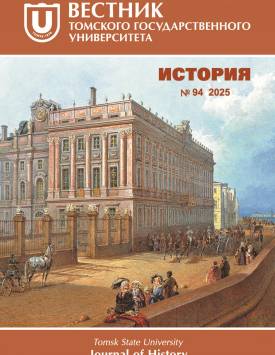The myth of the “New Europe”: German propaganda for ostarbeiters in the occupied Soviet territory (based on the materials of the General District of Belarus)
The article deals with the problem of German propaganda for ostarbeiters in the occupied Soviet territory (based on the materials of the General District of Belarus). The purpose of the study is to consider the features of the thematic direction of German propaganda called "New Europe", to determine its target audience among the population of the General District of Belarus, to evaluate the effectiveness of German propaganda. The sources for writing the work were the documents of the National Archive of the Republic of Belarus (NARB), the Russian State Military Archive (RGVA), the Russian State Archive of Socio-Political History (RGASPI). Research methods - analysis, synthesis, comparison. The problem of German propaganda for potential ostarbeiters within the individual Soviet republics of the occupied USSR during the Great Patriotic War remains a little-studied problem until recently. Propaganda was an instrument of manipulation of the mass consciousness and a means of fulfilling the economic and operational plans of the German occupation authorities. In addition, the mythologeme of the «New Europe» was actively used by German propagandists to incite nationalist feelings and create a certain social support among the local population in the person of collaborators. It should be noted that the policy and propaganda of the German occupation authorities within the General District of Belarus had a number of specific features that were caused by a number of objective factors. Among them, it is necessary to mention the mass partisan movement, the partisan counter-propaganda, the long previous period of stay of this territory as part of other states, the peculiarities of the mentality of the local population. The German civil administration of the district, represented by V. Kube and his successor K. von Gottberg, made the main bet in the implementation of the occupation plans on ideological means. The propaganda of the myth of the «New Europe» was supposed to encourage potential workers from the East to voluntarily send them to work in the"Reich". At the same time, a wide variety of forms and methods of influence were involved: the media, holding holidays, organizing excursions to Germany, radio propaganda. The authors concluded that the effectiveness of the German ideological influence on the local Belarusian population was minimal. In general, the reaction of the population of the district to the German propaganda was characterized by a high degree of distrust and skepticism, since the content of the propaganda materials was in sharp contrast to the harsh reality. The policy of «scorched earth», methods of fighting against partisans, the genocide of Jews, the practice of forced recruitment of potential ostarbeiters - all this together leveled the slogans of German propaganda about the prospects of life and work of Belarusian ostarbeiters in Nazi Germany. The authors declare no conflicts of interests.
Keywords
General District of Belarus, the Great Patriotic War, German propaganda, the myth of the “New Europe”, ostarbeiters, collaborators, V. KubeAuthors
| Name | Organization | |
| Pushkarenko Elena A. | Russian Customs Academy | pushkarenko-elena@mail.ru |
| Tretyak Sergey A. | Institute of History National Academy of Sciences of Belarus | modernhistbel@mail.ru |
| Yanushevich Ivan I | Belarusian State University | ivan-jan@yandex.ru |
References

The myth of the “New Europe”: German propaganda for ostarbeiters in the occupied Soviet territory (based on the materials of the General District of Belarus) | Tomsk State University Journal of History. 2025. № 94. DOI: 10.17223/19988613/94/12
